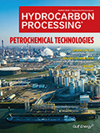Project Management
China's Wanhua Chemical starts operation at new east China cracker
China's Wanhua Chemical Group has successfully started up its 1.2-MMtpy mixed-feed cracker in east China's Shandong province and achieved on-spec production of ethylene.
PBF restarts some units at Martinez refinery after February fire; fire-damaged units remain shut
PBF Energy is restarting several refinery process units at the Martinez facility that were shut after a fire broke out in February. The process will take approximately two weeks
Burckhardt Compression awarded digital monitoring services contract for a chemical plant in Saudi Arabia
Burckhardt Compression has won a significant order for digital monitoring services in Saudi Arabia. This solution includes state-of-the-art PROGNOST® NT system to upgrade and digitalize a major customer’s reciprocating compressor installation in the Middle East.
ENEOS, A.P. Møller Holding and Maersk agree to invest $100 MM in C2X to advance green methanol portfolio
ENEOS has signed an investment agreement with C2X to advance the development of the Beaver Lake Renewable Energy project in Louisiana to FID and to further develop its global green methanol project portfolio.
Clariant’s MegaMax 900 catalyst: Powerful start at European Energy’s e-methanol plant
Clariant announced the successful startup of its MegaMax 900 methanol synthesis catalyst at European Energy’s e-methanol plant in Kasso, Denmark. The facility uses biogenic CO2 and green hydrogen to produce up to 42,000 tpy of green methanol
Colombia's Ecopetrol to invest up to $700 MM in SAF production plant
Colombia's state-run energy company Ecopetrol plans to invest up to $700 MM to build a plant at the Barrancabermeja refinery to produce sustainable aviation fuel
Ergon to invest $400 MM to expand gasoline production at Vicksburg refinery (U.S.)
Ergon Refining Inc. has announced plans to invest $400 MM to expand processing capabilities at our Vicksburg, Mississippi, refinery to include gasoline production, which is expected to come online during the first quarter of 2027.
U.S. EPA's upcoming proposal on biofuel blending mandates to cover two years
The U.S. Environmental Protection Agency plans to release a proposal on biofuel blending mandates that covers two years worth of mandates, instead of a proposal that covers three years
ExxonMobil to invest more than $100 MM in Baton Rouge upgrade to produce high-purity isopropyl alcohol
ExxonMobil announced its plans to invest more than $100 MM in facility upgrades to produce high-purity isopropyl alcohol, a critical material for semiconductor chip manufacturing in the U.S.
KazMunayGas starts building polyethylene plant with Sinopec, SIBUR
The plant will have a pyrolysis unit which will use the technology of the U.S.-based Lummus, an ethylene polymerization unit using the technology of Chevron Phillips Chemical and Univation Technologies, as well as a butene unit using Axens technology

- China's Wanhua Chemical starts operation at new east China cracker 4/4
- Brookfield Infrastructure announces the acquisition of Colonial Enterprises for $9 B 4/4
- PBF restarts some units at Martinez refinery after February fire; fire-damaged units remain shut 4/4
- Japan to curb gasoline prices from June to cushion U.S. tariff blow 4/4
- Evonik presents innovative "Debonding on Demand" concept for more sustainable bonding 4/3
- Oil, gas and refined product imports exempted from Trump’s sweeping tariffs 4/3




